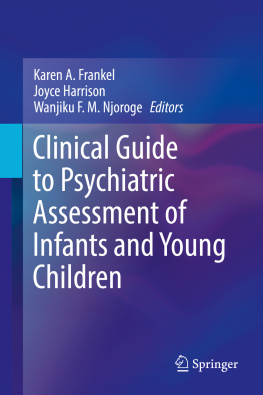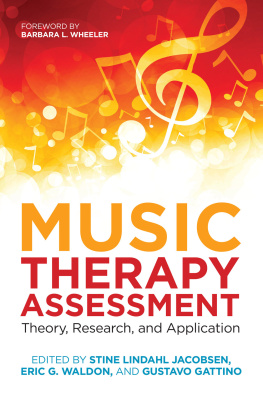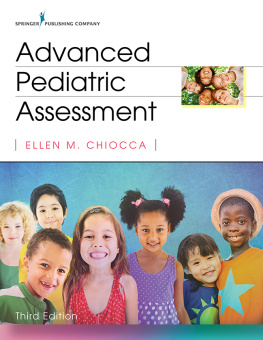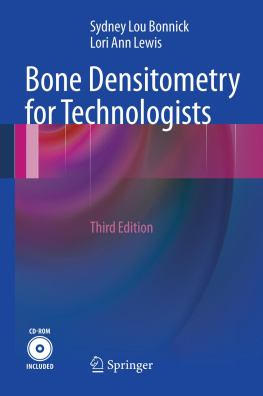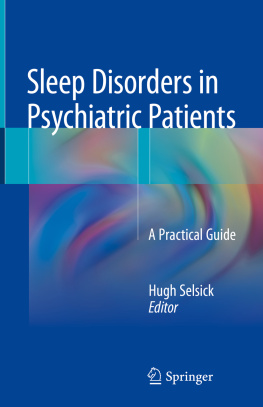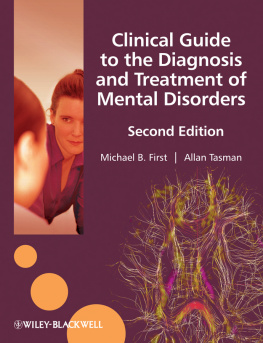Karen A. Frankel - Clinical Guide to Psychiatric Assessment of Infants and Young Children
Here you can read online Karen A. Frankel - Clinical Guide to Psychiatric Assessment of Infants and Young Children full text of the book (entire story) in english for free. Download pdf and epub, get meaning, cover and reviews about this ebook. year: 2019, publisher: Springer International Publishing, genre: Children. Description of the work, (preface) as well as reviews are available. Best literature library LitArk.com created for fans of good reading and offers a wide selection of genres:
Romance novel
Science fiction
Adventure
Detective
Science
History
Home and family
Prose
Art
Politics
Computer
Non-fiction
Religion
Business
Children
Humor
Choose a favorite category and find really read worthwhile books. Enjoy immersion in the world of imagination, feel the emotions of the characters or learn something new for yourself, make an fascinating discovery.
- Book:Clinical Guide to Psychiatric Assessment of Infants and Young Children
- Author:
- Publisher:Springer International Publishing
- Genre:
- Year:2019
- Rating:5 / 5
- Favourites:Add to favourites
- Your mark:
- 100
- 1
- 2
- 3
- 4
- 5
Clinical Guide to Psychiatric Assessment of Infants and Young Children: summary, description and annotation
We offer to read an annotation, description, summary or preface (depends on what the author of the book "Clinical Guide to Psychiatric Assessment of Infants and Young Children" wrote himself). If you haven't found the necessary information about the book — write in the comments, we will try to find it.
Karen A. Frankel: author's other books
Who wrote Clinical Guide to Psychiatric Assessment of Infants and Young Children? Find out the surname, the name of the author of the book and a list of all author's works by series.
Clinical Guide to Psychiatric Assessment of Infants and Young Children — read online for free the complete book (whole text) full work
Below is the text of the book, divided by pages. System saving the place of the last page read, allows you to conveniently read the book "Clinical Guide to Psychiatric Assessment of Infants and Young Children" online for free, without having to search again every time where you left off. Put a bookmark, and you can go to the page where you finished reading at any time.
Font size:
Interval:
Bookmark:


This Springer imprint is published by the registered company Springer Nature Switzerland AG
The registered company address is: Gewerbestrasse 11, 6330 Cham, Switzerland
This book is dedicated to our families Doug and Jess Carrel; Mbugua, Josephine, Njoroge M. Njoroge, and Suzanna Reiss; and John, Matt, and Kat Harrison, who supported us, tolerated us, and loved us while we undertook this effort across the years and globe.
The validity and the importance of early childhood psychopathology have both become increasingly clear over the last two decades. An expanding body of empirical research on the manifestations, longitudinal outcomes, and neural correlates of psychopathology in young children, as well as the unique efficacy of early intervention, has catalyzed this field. Disorders of infants and preschoolers are now a widely accepted clinical phenomenon and of interest to groups beyond those with a specific focus on early childhood development and psychopathology, to those practicing in mainstream mental health. Based on this, the need for clear guidelines on developmentally sensitive and appropriate assessment techniques has taken on even greater importance and urgency. Innovations in this area have facilitated the clinical research providing the advances in our ability to detect and understand the etiology and course of early childhood psychopathology. Now, many of these methods and measures can be utilized in clinical settings and may serve as very useful tools for conducting an age-appropriate and clinically meaningful assessment as outlined in the following chapters.
The chapters contained in this volume outline developmentally sensitive principles and approaches to the clinical mental health assessment of young children. While these methods may be applied using a variety of adaptations and forms and in different clinical settings, it is important to note that such developmentally specific approaches are critical to obtaining a valid and clinically meaningful mental health assessment of a young child. Failure to utilize age-appropriate methods may result in both overdiagnosis and failure to detect symptoms and disorders of the young child. Several central principles underlying the unique features of the assessment of the young child are outlined in the book. First is the central importance of the dyad to the emotional and social functioning of young children and the related need to conduct the evaluation in the context of the caregiver-child relationship. Related to this, the assessment of parenting style and internal representations which impact parenting is also central and elaborated upon in several chapters. These issues while important in all child assessments are critical to the mental status exam and diagnostic formulation of the young child. The importance of the play setting and the use of play as the medium of expression is also a central theme. Several other principles are key, such as the need to consider behavior in context (including relationship context) and the need to assess the child with different caregivers and on more than one occasion to account for the significant effect of state on a young childs mental status. The reader can utilize the information in this volume to apply these methods and principles to conduct an age-appropriate mental health assessment of young children.
This volume also touches on diagnostic systems that can be applied in early childhood, reviewing the merits and limitations of both DSM 5 and DC:0-5. While it does not provide a review of empirically supported treatments for mental disorders in young children, it does touch on more global issues such as how to assess for the need to evaluate the potential use of psychopharmacology. The volume, while not prescriptive, provides a comprehensive overview of the key principles to be considered and numerous tools and approaches that can be utilized in the age-appropriate mental health assessment of the young child. Importantly, a true embrace of these principles and methods is nothing short of prerequisites for the appropriate and accurate mental health assessment of the young child. This comprehensive book provides a highly clinically useful review of these essential principles.
We are pleased to offer this volume as a hands-on guide to the assessment of very young children and their caregivers. Each of the editors (and most of the authors) has worked for decades in the area of infant and early childhood mental health, training and teaching new generations of providers. Joyce, Wanjiku, and I have longed for a single text that brought together resources describing the comprehensive process of evaluating infants, toddlers, preschoolers, and their caregivers. Infant and early childhood mental health is a complex subspecialty of child mental health which takes a unique lens toward assessmentone that is relationship-based, contextually grounded, culturally sensitive, and diversity-informed and requires competence in adult, child, and relationship assessment skills. Learning all of these domains can be daunting for trainees and seasoned professionals as well. We hope this volume will make the task more accessible and enticing!
Font size:
Interval:
Bookmark:
Similar books «Clinical Guide to Psychiatric Assessment of Infants and Young Children»
Look at similar books to Clinical Guide to Psychiatric Assessment of Infants and Young Children. We have selected literature similar in name and meaning in the hope of providing readers with more options to find new, interesting, not yet read works.
Discussion, reviews of the book Clinical Guide to Psychiatric Assessment of Infants and Young Children and just readers' own opinions. Leave your comments, write what you think about the work, its meaning or the main characters. Specify what exactly you liked and what you didn't like, and why you think so.

